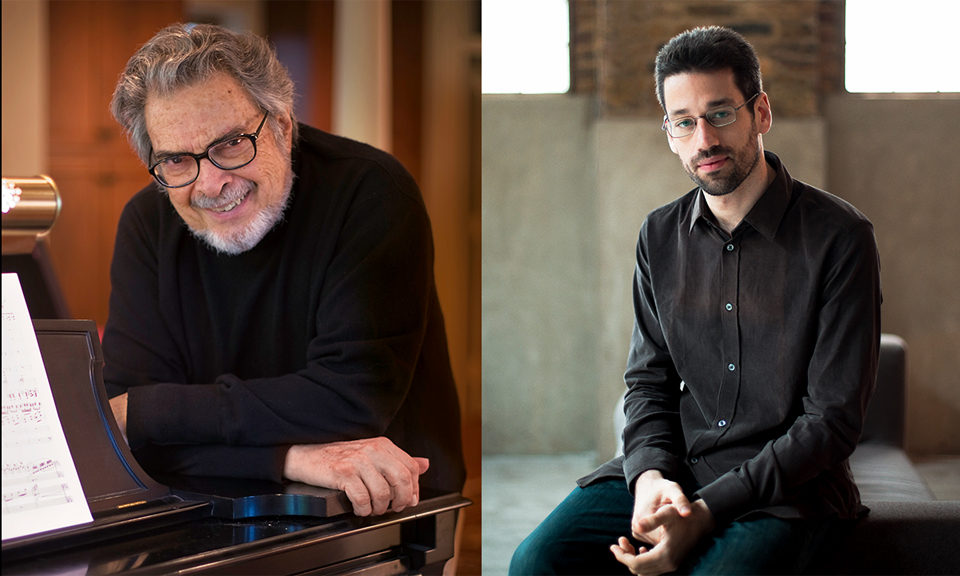
Pianist: The father of us all?
You could write a book about pianist/teacher Leon Fleisher: Childhood prodigy, collaborator with Hertz and Monteux, student of Artur Schnabel, recipient of Rachmaninoff’s advice, victim of a severe three-decade right-hand injury, commissioner and performer of numerous left-hand-only compositions, eminent Peabody teacher. Now 90, the indestructible Fleisher returned to San Francisco to play a Mozart concerto, cautious solo pieces and reminiscences.
Some think that the Year One for American pianists bursting onto the international scene was 1958, with Van Cliburn winning gold in Moscow. But six years before that, San Franciscan Fleisher had already won the Queen Elisabeth Competition in Belgium.
As player and teacher, he projects the pensive figure of a legendary philosopher on stage, given his full head of hair and generous beard, more gray than white. And his words of wisdom resonate today as he tells students, “The purpose of music is to communicate heart to heart,” and “Place each note as late as possible, without being TOO late.”
This child prodigy linked very distant, legendary eras. He was brought up in the West Coast bailiwick of conductors Alfred Hertz and Pierre Monteux, both born in the 1870s; he played under Monteux and the N.Y. Philharmonic as a teenager. And as an even younger kid and would-be concert pianist he met Sergei Rachmaninoff, who memorably bent over his huge frame and told him in a deep, gravel-y Russian accent re piano, “Bad business, bad business!”
Much later he incurred a medical oddity, focal dystonia (usually ascribed to practice, practice, practice). That lamed his right hand, prompting the next three decades of performing left-hand-only works, both from repertory and from his commissions, carried off as adroitly as Willie Mays making one-hand catches out near the center-field wall. That set produced “L.H. for Leon Fleisher” by Leon Kirchner, a work he played again here, ranging all over the keyboard, with the strong thumb in a dominant up-keyboard position. The two-part seven-minute tonal selection focused on rapid broken chords before slowing to a reflective quasi-improv, with dialogues between bass and treble registers. Responding to the audience ovation, he held the score aloft on high in tribute to the late composer.
Happily with therapy Fleisher recovered from the impediment and returned to two-hand music. As if to recall his many Mozart recordings with conductor George Szell, he climaxed the “90th” concert on Feb. 12 playing Mozart’s Piano Concerto No. 12 with string quintet in place of orchestra, calling on the Naumberg-Award winners, the Telegraph Quartet. He slowed the pace noticeably and majestically, as in all his program. But more than once he offered spotless clarity and precise trills with 3rd and 4th finger right hand (amateurs, attempt it at your own risk!).
Short solo works also took the spotlight, starting with a methodical Bach “Sheep May Safely Graze,” where he brought out the contrapuntal line quite beautifully. His measured steps in the Chopin Nocturne (D Flat Major, Op. 27 No. 2) and Debussy’s “Clair de lune” brought down the house at the nearly sold-out Herbst-Theater love-in, made up of fans, well-wishers, and maybe a select few remembering his childhood emergence. Less familiar was the habañera of Debussy’s prelude “La puerta del vino,” one of that master’s notable musical forays south of the border.
One of his most successful former students, Jonathan Biss, shared the program performing Beethoven’s challenging late sonata (No. 30), full of flair, contrast and discovery. Echoing Fleisher’s narrative about his childhood concerto memory lapse, Biss had one of his own in the Andante finale, recovering quickly. An embarrassment? That’s ridiculous. A mar or missed note simply shows that virtuoso pianists are human, too, just like the rest of us.
Varied concerts under auspices of S.F. Performances, at Herbst Theatre, S.F. and elsewhere. For info: (415) 392-2545, or go online.